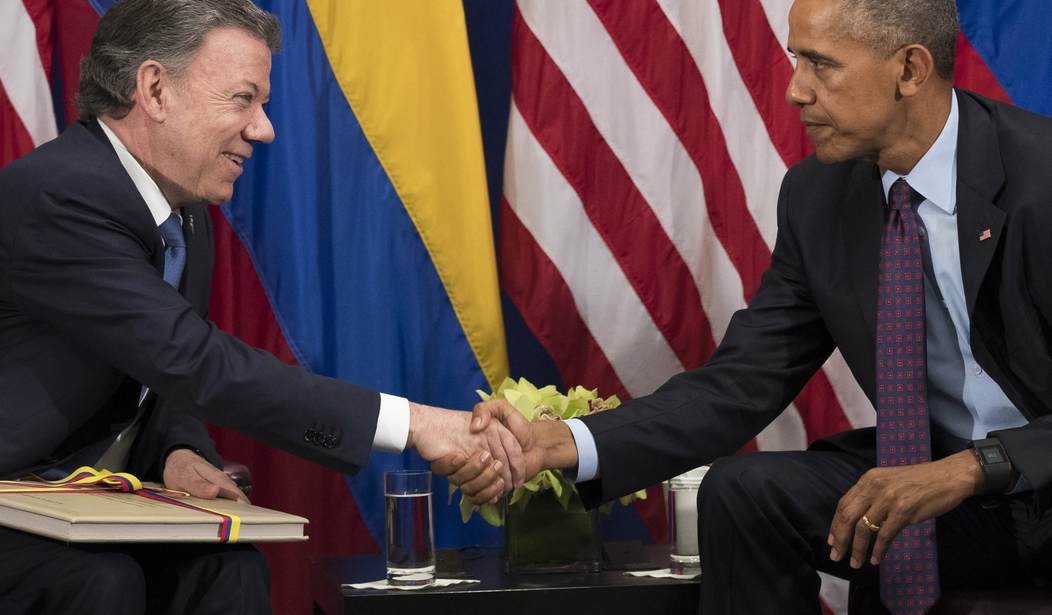In 2009, the Nobel Committee awarded President Barack Obama with the Nobel Peace Prize. At the time, Obama was the heartthrob of Europe, having traveled to Middle Eastern countries in a historic outreach to the Muslim world. Seven years later, however, the world is less peaceful than when Obama took office. Rather than learning from this historic mistake, the Nobel Committee has jumped the gun yet again.
On Friday, the committee announced that the Peace Prize will be awarded to Colombian President Juan Manuel Santos, for his historic efforts to establish a peace deal which would end the 52-year war against Marxist guerrilla FARC rebels. Santos deserves praise for bringing FARC to the table (which took his administration no less than four years, CNN reported), but last weekend, the Colombian people rejected the peace deal — albeit by a razor-thin margin (50.22 percent against, 49.78 percent for).
Critics blasted the deal for being too soft on the rebels, whose organization has committed murder, extortion, and kidnapping for decades. On Tuesday, Santos publicly declared that the cease-fire with FARC rebels will end on October 31, should no further agreement be reached.
Nevertheless, the FARC rebel leader Timoleon “Timonchenko” Jimenez congratulated Santos for his Nobel Peace Prize.
Felicito al presidente Juan Manuel Santos, a garantes Cuba y Noruega, acompañantes Venezuela y Chile sin los cuales seria imposible la Paz
— Rodrigo Londoño (@TimoFARC) October 7, 2016
One again, the Nobel Peace Prize goes to a president who has not yet achieved peace. Let us hope that Santos’s track record proves more illustrious than Obama’s, seven years after his receipt of the Nobel Peace Prize.
Indeed, the Nobel Committee’s ex-secretary, Geir Lundestad, expressed regret over awarding Obama the Peace Prize. “No Nobel Peace Prize ever elicited more attention than the 2009 prize to Barack Obama,” Lundestad wrote in his memoir, released last year. While the Nobel Committee hoped the prize would strengthen Obama, it ended up weakening him. “Even many of Obama’s supporters believed that the prize was a mistake. In that sense the committee didn’t achieve what it had hoped for,” Lundestad wrote.
Next Page: How the very philosophy which won Obama the Nobel Prize destabilized world order.
As The Wall Street Journal‘s Sohrab Ahmari wrote, however, “this Nobel indigestion is unfair to Mr. Obama. On its own terms his prize has been a resounding success. Seven years later the president has achieved the future-tense victories first celebrated in Oslo.”
Ahmari noted that the Nobel Committee hoped for an America which “would no longer play the hegemon.” Instead, the Norwegians wanted the U.S. president to “strengthen international diplomacy and cooperation between peoples.” They wanted a president who would emphasize “the role that the United Nations and other international institutions can play.”
This philosophy of transnationalism, which holds that all states must submit to norms drawn up by organizations such as the United Nations and the European Union, could not tolerate a stronger United States which imposes its will on others. Mr. Obama indeed applied the philosophy to his governance, and it has wrought disastrous consequences.
As Ahmari argued, the real-world results of this policy “are on display in Aleppo, where the Bashar Assad regime and its Russian and Iranian patrons are close to bringing to heel Syria’s last non-Islamic State opposition stronghold.”
The growth of Putin’s Russia — not just in Ukraine and Syria, but also in the Arctic, in Kazakhstan, and across Europe where Russian planes have been detected as far as British airspace — is a stunning indictment of Obama’s foreign policy. Ahmari noted that “Mr. Putin’s pilots are also increasingly menacing European homelands, with the French Defense Ministry revealing Wednesday that Russian military aircraft last month skirted the airspaces of France, Norway, Spain, and the U.K., forcing all four countries to scramble jets.”
Europe is in disarray, plagued by economic and fiscal crises and a tidal wave of refugees from the Middle East. Ahmari concludes:
The Nobel Committee, and the intellectual class whose preferences it reflected, had loftier ideas. In 2009, they thought that without U.S. “unilateralism,” the world could settle enmity and evil the same way the EU resolves disputes over agricultural subsidies. This was when EU boosters like the historian Tony Judt still wrote of the 21st century as a European century—when the rest of the world would embrace the European way of dialogue.
Seven years later the Europeans can barely solve their subsidy disputes, and the Continent has had quite enough of the philosopher-president.
Santos, as president of Colombia, does not hold the global clout and power of an American president, and so if 2016’s Nobel Prize proves as premature as the 2009 edition, the consequences will be far less dire for the world as a whole.
Nevertheless, Santos’s selection hints that the Nobel Committee has not learned from its 2009 mistake. No matter how impressive the Colombian president’s efforts for peace with FARC have been (and indeed, there is no question they are impressive), peace has not yet been achieved — and it remains possible that the Colombian people’s reticence to forgive FARC rebels will inspire those guerrillas to be even harsher should hostilities flare up again in November.









Join the conversation as a VIP Member